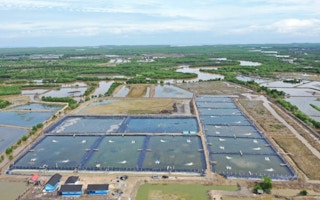The Indonesian government plans to have a network of dozens of villages with aquaculture farms by the end of the year, in a bid to spur the post-pandemic economic recovery by catering to global demand for farmed seafood.
Indonesia’s fisheries ministry said in December that it has established six of these so-called aquaculture villages and would add 130 more by the end of 2022. The villages will cultivate high-value aquaculture commodities, including shrimp, lobster, crab and seaweed.
“Boosting production of commodities for exports comes first,” TB Haeru Rahayu, the ministry’s director-general of aquaculture fisheries, said at an online event. He added the program would strengthen the country’s food security and create new jobs.
At the start of his second term in office, in 2019, President Joko Widodo ordered the fisheries ministry to boost the country’s aquaculture productivity. Global aquaculture production grew by 527 per cent from 1990-2018, with Indonesia among the top producers worldwide. The country’s aquaculture output in the third quarter of 2021 was 12.25 million tonnes metric tonnes, a 6 per cent increase from the same period in 2020. The aquaculture sector contributed the equivalent of $1.94 million in non-tax state revenue for the year to November 2021, well above the target figure of $1.39 million, according to the ministry.
While Indonesia is a top global exporter of frozen seawater shrimps, it lags its neighbors in exports of freshwater shrimp and fresh, salted or smoked shrimp. Some of its top export species include Asian tiger shrimp (Penaeus monodon) and whiteleg shrimp (Litopenaeus vannamei).
Experts have welcomed the government’s push to boost the aquaculture sector, but say it must guarantee sustainable environmental planning, particularly in terms of land clearing and waste management for the farms.
Developing aquaculture farms in Indonesia has typically entailed clearing carbon-rich mangrove forests to build the shrimp and fish ponds, said Abdul Halim, executive director of the Center for Maritime Studies for Humanity. Over the past three decades, Indonesia has lost nearly half of its mangrove area, according to the Center for International Forestry Research (CIFOR). In 2021, President Widodo set an ambitious goal of replanting mangroves on 600,000 hectares (1.5 million acres) of degraded coastline by 2024.
Abdul said the government must also be able to resolve the waste management problems long associated with aquaculture farms, which typically pump the waste into the sea or lakes. The planning ministry in 2019 announced that 15 lakes were in “critical” condition as a result of environmental degradation, mostly caused by human activities, such as pollution, logging and destructive fishing practices. Recurring mass fish die-offs are commonly reported events in some of the lakes.
Abdi Suhufan, national coordinator of the NGO Destructive Fishing Watch (DFW) Indonesia, said the government must resolve fundamental challenges facing the country’s aquaculture sector, such as having a detailed map of the farms, clearly defined status for the land, and sound water management.
Revitalising the shrimp farming industry has been a perennial priory of the government for years, with a focus on avoiding mangrove deforestation. However, there’s been little or no progress on this front, Abdi said.
“There needs to be a reformative change in the aquaculture sector if it wants to achieve the productivity targets,” he said.
This story was published with permission from Mongabay.com.








